#atla meta
Note
okay so I’ve seen and loved a bunch of these posts already but everything u say is immediately correct and amazing and sending u asks is the best
opinions on why zukka works and makes sense as a ship and if you think it could work in canon (outside of fanon)?
I CANT BELIEVE YOU JUST MADE MY ENTIRE LIFE COMPLETE AND FULL BY ASKING ME THIS QUESTIONNNN (strap in folks hold on to your hats keep a good hold on your bladders bc this is 10+ years worth of BUSINESS)
Why "Zukka" works and makes sense as a ship
something i've discussed THROUGHLY with my notes app and a school slides presentation is that Zuko and Sokka are both direct parallels AND contrasts to one another, at the same time. i'll list them out here:
Their fathers' roles in their lives
Both Hakoda and Ozai were the leaders of their respective nations, with Sokka and Zuko as the heirs. Then, they both become absent in their sons' lives and leave them to fend for themselves.
This is a parallel, but this is also where they contrast. Sokka's father left to go fight in the war, a noble and honest pursuit, and left Sokka to protect his sister and the village.
Ozai, on the other hand, cast Zuko out of the nation and forced him to protect and defend himself, while effectively turning all their people and his own sister against him.
Their sisters' roles in their lives
Despite both of them being the oldest sibling and brother, they both have severe inferiority complexes due to their younger, powerful bending sisters.
With Katara, she was the only waterbender in the entire tribe, a marvel. She could learn to protect the tribe in a way that Sokka had been trying all his life, and she eventually does. Despite all this, Katara is still a grounding and valued person in his life, and he would be completely lost without her (something he openly admits to in canon!!)
With Azula, she was a prodigy firebender, while also being a special kind of keen and cunning. She was adored by their father and grandfather and Zuko could never quite measure up. Because of this, Azula is the main villain in Zuko's childhood. She does everything she can to break him down, and that continues when she returns as a character in his life in season two. All throughout the show, instead of being a source of comfort and familial love, she is his main obstacle he must overcome.
The loss of their mothers
Both Sokka and Zuko lost their mothers at very young ages to the Fire Nation, but they had vastly different impacts on their families (and further developed their sisters' roles in their lives!!)
When Sokka's mother died, she was killed by a Fire Nation general. Katara quickly took over the motherly role in his life, cementing her place as a grounding and comforting force. Her death also did not break their family. It deeply hurt all of them, but Katara, Sokka, and Hakoda still loved one another just as much as before.
When Zuko's mother died (obviously not really, but this is what he believes for many years), she was "killed" in order for his father to ascend to the throne and become Fire Lord. This left Zuko without anyone to protect him from Azula's tormenting and cemented her place as a destructive, villainous person in his life. Ursa's death also did destroy their family. Whatever way she had managed to keep them all together was eradicated, and Zuko was left with a sister and father that resented him and a sister fighting for his place in the line of succession.
Their obessesions
Both Sokka and Zuko had two bone-deep obsessions that were very defining parts of their characters in the first season, that slowly wavered and faded away as the story progressed and they developed as people. They were both given these obsessions by their fathers immediately before they became absent in their lives (whether leaving themself or sending their son away) and proceeded to dedicate their entire life to these goals in the name of honor.
With Sokka, his father asked him to protect his sister and his village. Sokka then dedicates all his time and energy to becoming a brave soldier and training the children of the village in order to protect his people. This is seen further in season one even after they leave, when he is overly protective of Katara and constantly worried for her safety (something this fandom doesn't talk about enough!!)
With Zuko, his father sent him on a wild goose-chase to find the hundred-years-lost Avatar, and when he actually does, all he can do is chase after Aang so he can go back home. As we see in season three, letting go of capturing the Avatar was essentially letting go of his former self.
Unlearning their flawed cultures (the big one!!!!)
Both of their cultures had many flaws that became ingrained in their belief systems and characters; their whole development is dedicated to unlearning these flawed teachings and reorienting their perception of the world.
It is very obvious throughout the shows that the Water Tribe had strict gender roles that were both implicitly and explicitly taught from birth. The men go off to fight in the war, the women take care of the children, Sokka has to protect his "defenseless" little sister, etc. Suki helped start him on the journey of unlearning his deeply-rooted misogyny, and by the end of the series he's really drinking the Respect Women Juice™️ (unlearning the flaws of his culture also brought him much closer to his sister and strengthened their bond and respect for one another)
The Fire Nation is a lot more complicated with a lot more cultural nuances and implicit and explicit teachings, but we'll focus on one central cultural theme: the constant prioritization of ambition over absolutely everything else, including (if not especially) love. (I actually talk about this extensively in another analysis post about Azula, if you want to check that out<3) We see Zuko battle with this teaching all throughout the series, and it is the main conflict he faces, at its heart.
We watch him commit his entire life to capturing the Avatar in season one. We watch him betray his uncle in season two. We watch him, time and time again, put his own health and safety on the line trying to capture Aang, especially in season one. Constantly, over and over again, he puts his ambition first because that was what he was taught.
And though this is a trait him and Azula share, it is also what pits them against each other. Azula's entire character is built on putting ambition first, and that leads her to chasing the throne that is Zuko's birthright. Zuko just wants to go home, but that would reestablish him as the heir to the throne. Time and time again, we watch them fight and betray each other, constantly battling for this crown for a broken nation. In the end, it is Azula's undoing, but that's another post.
All in all, unlearning the flaws of their culture is central to their development as characters and a place where they parallel... but it is also a place where they directly (and perfectly) contrast.
Despite the cruelty of the Fire Nation, they are the only military that includes women. They seem to not really struggle with the same gender roles the rest of the world does. They may be colonizers, but they're not misogynists. Zuko never looked down on his sister because she was a woman, nor did her father. It was always her propensity for cruelty that undid her. (They even send a team of highly skilled women to capture the Avatar!!)
This is a direct contrast to the teachings of the Water Tribe, which are entrenched in misogyny and gender roles. The men go off to war, the women stay behind. The men are strong, the women are weak. Can you imagine how much Zuko could have assisted Sokka in his development here? (blah blah directly paralleling Suki's role in Sokka's life blah blah blah)
In the Water Tribe, love and family comes before everything. We see that time and time again. Sokka's main priority, every time, is his sister and his tribe. They stick together. They love one another. They are united, with one person leading them as a group but not standing over them like a tyrant. "Ambition" seems like a mostly unheard of concept in their nation. The only ambition we ever really see from Sokka is when he's trying to protect his tribe (season one finale)!!
Can you imagine how much Sokka could have helped Zuko unlearn his constant prioritization of ambition?? Like, come on. All the things Zuko was left to stew with and angst over all on his own Sokka could have gently taken into his own hands and shown him the way. Like, it actually makes me go feral just thinking about it. Sokka could have helped Zuko so much!! (pushing the Ba Sing Se Zukka AU rn)
Consensus
Okay, let's recap. It looks like Zuko and Sokka are both direct parallels and contrasts, paralleling in the ways that allow them to understand each other but contrasting in the ways that help them heal one another. Like, it's actually insane. I really don't know if it was intentional or not but it's really just so perfect. They slot together perfectly as characters. I hope this all made sense😭😭
Could "Zukka" work in canon?
Now, this is tricky. Believe it or not I'm actually really glad they didn't make Zukka canon. ATLA had a huge problem with writing good romance, and in the canon we saw in the show, neither Sokka or Zuko were in a place to get together.
I've enjoyed my fair share of Zukka AUs where they get together before the end of the war, but you and I both know that would have been a hot mess. (Both of them just weren't ready, they were both in relationships, and sorry but they were kinda busy—Katara was right about the whole "there are other things to worry about.") If they were ever to get together in canon, it would have to be years after the war ended.
Let's address a few things that needed to happen before they could ever have gotten together:
Finally admitting that Maiko was just an extreme example of comphet
Zuko did not give a single shit about that girl. Like. He didn't even personally go get her out of prison WHEN SHE WAS LITERALLY ARRESTED FOR PROTECTING HIM😭😭 And then they try to play off their story as some big epic romance?? uhhhh no
(really, Mai was in long-time unrequited love with Ty Lee that was finally requited after Boiling Rock but idk if society is ready for that yet)
Not to mention, Azula literally forced both of them into that relationship, but if I get started with that I'll never stop so. Moving on.
Figuring out Sokka and Suki
Okay, so while there is a good chance that Sokka and Suki could have made it work in canon, there is also a good chance they would have broken up. They both had very different priorities: while they both did care about overall world peace, it was obvious from Suki's first introduction that her Kyoshi Warriors were her top priority every time, and Sokka's was his tribe, his found family (Aang, Katara, Toph, Zuko, yk yk), and world peace at large. You're telling me those don't conflict? Especially because they really seem like a Piper/Jason situation, where they found comfort and love in each other during wartime but wouldn't have known how to keep up the relationship without the constant threat of death.
Overall, in order for Zukka to work, Sokka and Suki would have had to break up, which would not have been difficult to arrange.
Sokka needed to go home and begin rebuilding the Water Tribe
No matter how much I adore fics where Sokka stays behind in the Fire Nation and helps Zuko rebuild, it just wouldn't work. Sokka's obvious priority had always been his tribe. The second the war was over (ignoring the comics bc that's a can of complicated worms i don't want to get into), he would've gone back with Katara to work on rebuilding their destroyed tribe. Only once the Southern Tribe could stand steadily on its own two legs could he have even considered leaving.
Anyways, that's really it. In order for Zukka to work, three plot points would have to be resolved: Maiko, Sukka, and the reparation of the Southern Water Tribe. Extremely doable, imo.
Personality-wise and just as characters, would it have worked?
I really think it would have! Like I said before, Sokka and Zuko are two characters that perfectly parallel and contrast at all the exactly right points to make them slot together flawlessly as a pair. (Whether that's romantic or not—doesn't matter.) Really, I genuinely think they are a real missed opportunity. I have genuinely never seen two characters that seem so different that actually work that well together, or even just characters that work that well together at all.
Like, I really mean it, they are perfect matches. It's genuinely scary. Like it or not, no one will ever be able to replicate the perfection of what Zukka could have been.
Anyone that says that it's "random" or "doesn't work" obviously hasn't been watching the same show or simply just hasn't been paying attention. People might ship it just because it's opposites attract or red and blue or even just the most accessible MLM ship in the fandom, but they really are perfect for each other.
alright, I think that's it! sorry for this monster of a post😭😭 genuinely did NOT expect that to happen. PLS SEND ME ANY ASKS YOU CAN THINK OF ABOUT THESE TWO!! i have spent a concerning amount of time thinking about them and these show has analysis potential for days, so. (and who knows, maybe i'll finally post the like three unfinished fics i have for them💀💀 god knows i should)
thanks for the ask, and have a great day <3
#atla#avatar#avatar the last airbender#zukka#atla meta#atla ana#atla analysis#zukka nation#atla zukka#sokka x zuko#zuko#sokka#atla sokka#atla zuko
104 notes
·
View notes
Text
Zuko had a hard time living up to his sister. She was a firebending prodigy. No matter how good he was, she was always better. And their father favored her because of this.
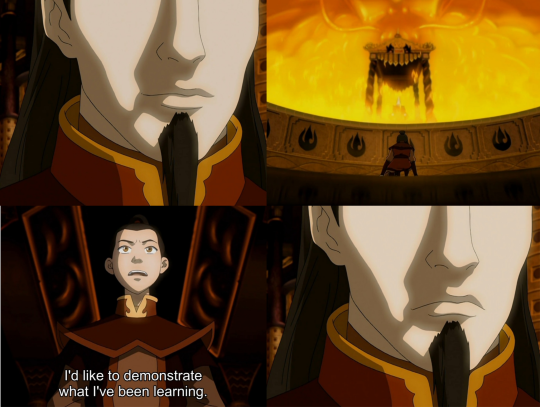
Ozai's abuse made it seem like he is not a good bender, just because he couldn't match his sister, the wonder child.
But Zuko is a Proficient Bender
At 16, he beat Zhao, a firebending master, at an Agni Kai.
He exercises the original firebending learnt from the dragons.
His firebending is influenced by other bending forms.
He's one of 3 people that at that time coulf redirect lightning.
After he'd recognized Ozai's cruelty towards him, he also casually recognizes that he is skilled, that he is good at firebending.

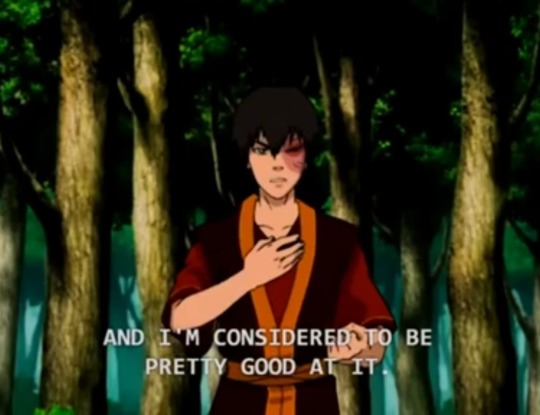
He casually recognizes that he is so good that he can teach the Avatar.
#zuko#zuko meta#atla zuko#azula#atla azula#atla#atla meta#avatar: the last airbender#avatar the last airbender#avatar aang#firebending#fire lord zuko#firelord zuko#prince zuko#ozai#fire lord ozai#firelord ozai#princess azula#avatar meta#avatar the last airbender meta#pro zuko#a:tla
51 notes
·
View notes
Text
Ugh I will always love the concept of Katara using blood bending to revive Zuko after the last agni kai, mostly because it makes no sense to me that Zuko was able to bounce back so easily after being struck by lightning, but also because the way the show treats bloodbending is just odd to me. It was a defense mechanism created by a traumatized victim of some of the most devastating parts of colonization, and although I understand that Hama was supposed to symbolize the "bad parts" of waterbending and was important for Katara's growth in realizing that the world isn't entirely black and white, its still disappointing to me that the show never explored the gray areas of blood bending, especially since that episode was, as I stated above, about understanding the gray areas of the war. Katara using blood bending to revive Zuko would add so much to the last agni kai in demonstrating that she has truly realized that "good" and "evil" are relative concepts, and Zuko being saved by both a defense mechanism of a survivor of colonialism and a type of bending used to terrorize his people would have even added to his arc, as the narrative required him to save and subsequently be saved by the physical embodiment of everything his family sought to annihilate.
#also just the angst potential#there are so many fics and better metas written about this but I had to throw my two cents in#Bryke's refusal to acknowledge bloodbending as anything but evil incarnate is so fucking annoying#anti bryke#bloodbending#zutara#zuko#katara#final agni kai#atla#avatar the last airbender#atla meta#zutara meta#technically
4K notes
·
View notes
Text
god i love fallible characters, but specifically zuko in the catacombs. choosing his sister over his uncle just to get to sleep in his childhood bed again. earning katara's kindness and empathy and stripping it all away in minutes because he ached for the familiar. fighting on the wrong side of history just to see his father smile with pride. knowing he could have done the right thing, but what is being good when you could be terrible but loved.
#zuko#avatar: the last airbender#avatar the last airbender#atla#atla meta#prince zuko#ozai#azula#iroh
8K notes
·
View notes
Text
So I've started rewatching ATLA to cleanse my palette, and I only now noticed this foreshadowing from the very first episode, the second scene with Zuko in the entire series.
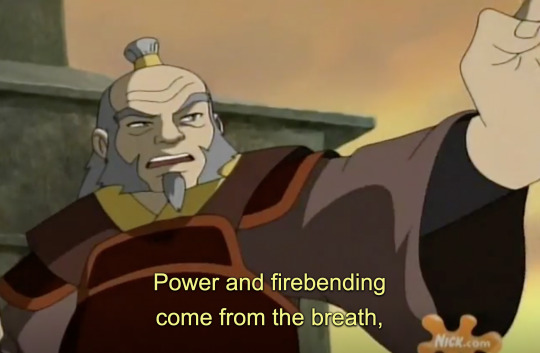


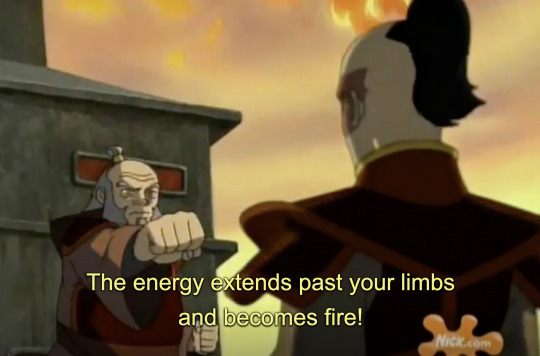
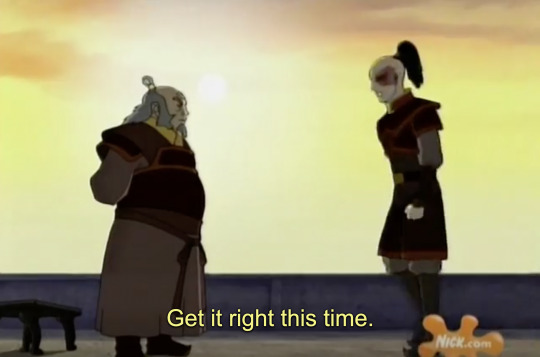
The show introduces the idea that Zuko's firebending isn't sustainable and is fueled by rage right at the beginning, which of course comes back in The Firebending Masters, where he can't firebend anymore because he doesn't have that rage. Basically that Zuko is cutting corners in his firebending through brute force and anger (a la "you will teach me the advanced set!"), and Iroh knows, or hopes, there will come a time that Zuko can't firebend like this.
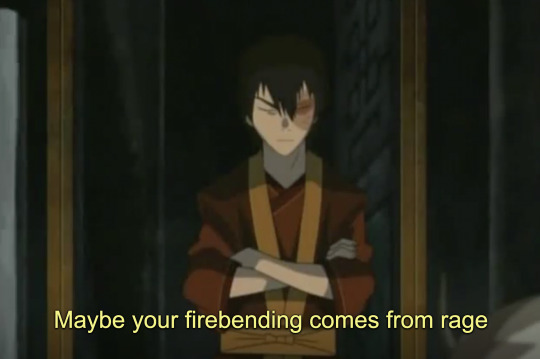

Just, so cool that I can always notice new things and nuances in this show no matter how many times I watch it.
2K notes
·
View notes
Text
Do you ever think about how 1 of the 1st waterbending moves that Katara learns, that she doesn’t come up with herself, is the water whip that she learns from that waterbending scroll, which also happens to be 1 of the final moves that she uses against Azula, using that move to manoeuvre Azula into a place more favourable for Katara??
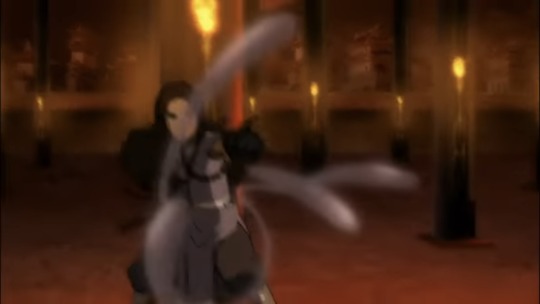
Do you ever think about how in that same episode that Katara learns that, Sokka tries to steer a boat, and laments how he doesn’t know how, because that boat wasn’t made by The Southern Water Tribe, and then, later, steers an entire Fire Nation war balloon with precision and intent, and knows how to destroy them effectively and efficiently, while also being a co-inventor of the inspiration invention of those Fire Nation war balloons??
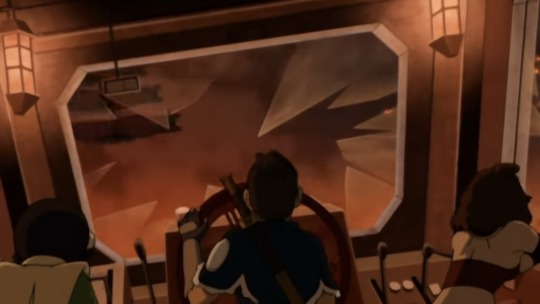
Do you ever think about how, when face-to-face with The Avatar in the Avatar State, after repeatedly threatening to imminently kill that Avatar like the other Air Nomads, Ozai’s 1st move is to firebend directly towards Aang’s left side of his face, the exact same spot that Zuko has his scar on??
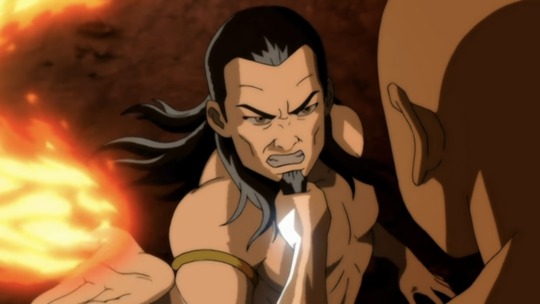
Do you ever think about how Zuko was challenged to his 1st Angi Kai due to his desire to protect people being unnecessarily put in harms way, and his final Angi Kai was ended due to the same reason??

#Avatar#Avatar: The Last Airbender#ATLA#Katara#Sokka#Zuko#Aang#Azula#Ozai#A:TLA#ATLA meta#Tess Speaks#Buffy Speaks
9K notes
·
View notes
Text
culture tips for writing asian settings: naming taboo
naming taboo is a big thing in the chinese cultural sphere. essentially, there's an importance attached to personal names that to certain extent makes it taboo to say the name of/name others after important persons—and by "taboo" i mean if you violated this, you would be seriously audacious
a MAJOR example of this is the name of the emperor. historically, people whose names shared the same characters as the emperor's had to change their names when he came to power. (certain benevolent emperors might change their names to obscure characters to avoid a statewide headache.)
within the family, these taboos discourage naming children after their ancestors (i was always weirded out that bella swan could name her KID after her PARENTS). there are also elaborate naming patterns for relatives, so you don't have to call older relatives by name (like "aunt lin" or "uncle mingchi")—there are terms in chinese that mean "dad's older sister's husband" etc. this is perhaps an extreme example but i only learned my grandma's name a month ago, because no one i know will say it, and it would've been rude for me to ask.
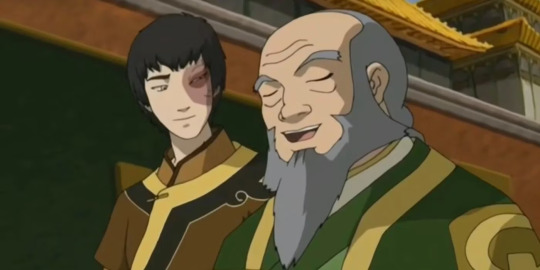
the taboo also applies to the names of famous and important people, like historical figures. this is quite different from, for instance, the catholic practice of naming children after saints.
if i had to explain the impetus behind the taboo, i would say names can be super personal in chinese culture. up until the early 20th century, chinese people could use several names in their lifetime, with different groups of people using different ones. naming someone after an important/respected person feels audacious, like you're prematurely trying to claim some of that importance
disclaimer | more tips
#atla#atla culture#atla meta#avatar the last airbender#asian culture tips#i love this tidbit bc it's just so.... NORMAL to me. and for years i thought it was normal for everyone else too but NO#i mean im sure bella swan is a major weirdo but imagine my shock when my catholic/ orthodox friends said they had like 4 nicks in the fam
3K notes
·
View notes
Text
thinking about the agni kai again.
because the thing is, the agni kai was a double bind. if zuko had stood and fought back against his father, ozai would have had him arrested, and most likely executed, for the crime of committing treason against the fire lord. because no one in the fire nation is allowed to challenge the fire lord; treason is exactly what it would have been, if zuko had attempted to fight in the agni kai. and when zuko kneeled at ozai’s feet and begged for forgiveness, he was still punished--condemed for his cowardice and exiled from his home.
there was literally no way for zuko to come out of this situation unharmed. no matter what he chose to do, it was going to be the wrong choice. and that’s ozai’s pai sho-winning masterstroke, isn’t it? zuko was never going to win, because ozai planned for him to lose all along.
zuko was set up to fail. and I don't think it's a coincidence that the word "agni" sounds so much like "agony."
and what strikes me is that this isn’t the first time we see the fire nation royal family set up a situation where there is no way to win. azulon set up a double bind of his own when he ordered ozai to kill zuko as a punishment for asking for iroh’s throne. the choice azulon gave ozai was to either kill his own son, or to refuse a direct order from the fire lord.
if ozai had killed zuko as azulon demanded, would he have recieved the throne he longed for? azulon might have been similarily setting ozai up to fail. if ozai had indeed murdered zuko, azulon could have had the power to arrest--and execute-ozai for the cold-blooded murder of a member of the royal family. and if ozai had instead refused to kill zuko, azulon would have been able to arrest him for refusing to follow a direct order from the fire lord.
if ozai had killed zuko as ordered, would azulon have actually given him iroh’s throne? while azulon may have favored iroh, it does not seem to me that he actually loved either of his children. but azulon’s demand for ozai to kill zuko could possibly have not been a punishment, but rather, a test--a challenge to see just how far ozai was willing to go to get the throne.
what kinf of price would ozai have paid, to secure the throne? what terrible deeds could ozai bring himself to commit, in order to get what he wanted?
the fire nation throne can only be bought with blood, azulon could be insinuating; iroh has paid that blood-price by offering up lu ten as a willing sacrifice to the war; now ozai must pay a blood-price of his own son, if he intends to rule.
and that blood-price will be paid, one way or another. ozai, with ursa’s help, figured out a way past the double bind: they chose to kill azulon instead, and in doing so won on both accounts--ozai didn’t have to kill zuko, and he still got the throne.
a fire lord must be willing to do the unthinkable in order to sit on the throne: he must be willing to kill even his own bloodline. perhaps that's why ozai so harshly condems zuko for his cowardice in refusing to fight the agni kai: a heir apparent to the fire lord must be willing to do whatever it takes to win the throne--and ozai's son surrendered without a moment's hesitation.
there’s something very biblical about about this kind of power struggle--ozai and iroh are jacob and esau, one using his cunning to steal the elder’s birthright and father’s blessing, and the other suffering from his brother’s deviousness; the same situation is repeated when zuko and azula are pitted against each other.
azulon’s order is the same kind of double bind as the agni kai: an agonizing choice, with no right answer, and no way for ozai to win. either way, azulon extracts a bloody punishment for ozai’s impertinence--just as ozai later does to zuko.
642 notes
·
View notes
Text
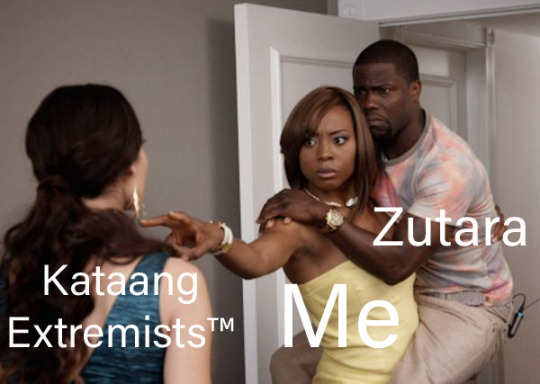
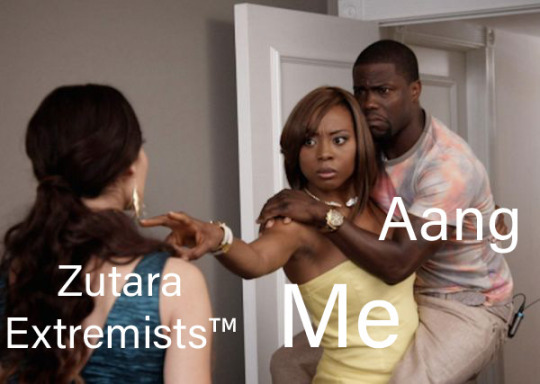
some of you are too angry at fictional children
#and it shows#like bffr#go touch grass#atla fandom critical#avatar: the last airbender#atla#atla meta#aang#katara#zuko#avatar the last airbender#zutara#avatar aang#atla aang#atla katara#atla zuko#prince zuko#fire lord zuko#master katara#atla meme#atla fandom problems#atla fandom salt#kataang critical#zutarian critical
706 notes
·
View notes
Text
I feel one of the scariest things about Ozai is not necessarily the physical abuse he pulls on Zuko or Azula. It's the mental abuse and how under the radar it is.
Yes, it is easy to look at Zuko's scar and be horrified by his abuse. What I feel is more effective was that Ozai made Zuko believe that he deserved it. That he had to go on this three-year odyssey to try and find the Avatar for a chance at gaining his love back. Their reunion isn't about Ozai apologizing. It's Ozai saying how proud he is of Zuko for making up for HIS mistake. He doesn't mention the Agni Kai at all, and when Zuko does turn, he tries to make it sound like some exercise in learning respect.
Same thing with Azula. Ozai puts the mantle of Fire Lord on her shoulders, effectively giving her the responsibility of running a country. He puts on so much pressure to have her to be perfect (pitting her against Zuko, sending her out on missions). The only approval that he gives is for her performance which reflects on him. Basically, he treats her more like an asset more than as a person. And any failing she makes is on her part.
He puts so much responsibility on both Zuko and Azula, but never takes any for himself. So if they displease his high expectations, that's their fault.
And they believe him.
#ozai#ozai atla#zuko#zuko meta#ozai meta#azula#princess azula#azula meta#fire lord ozai#atla#avatar the last airbender#atla meta
718 notes
·
View notes
Text
Ty "Lee"
We all remember that Ty Lee has six identical sisters and joined the circus so she wouldn't be part of a matched set forever, but I don't think I've ever seen anyone talk about one specific sentence in that moment (I certainly hadn't thought about it before today)
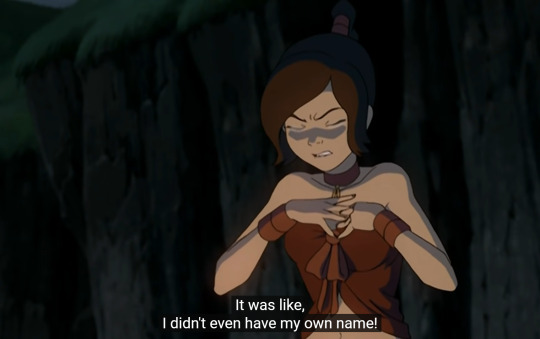
And then I realized.
It's well-established that Lee is the most common, generic name anyone can have in the Avatar Universe. The perfect no-effort name to dump on a child you weren't expecting to have because no one expects to birth 7 babies in one go.
6 though? That's a sensible number. The rest of 'em can have more meaningful given names.
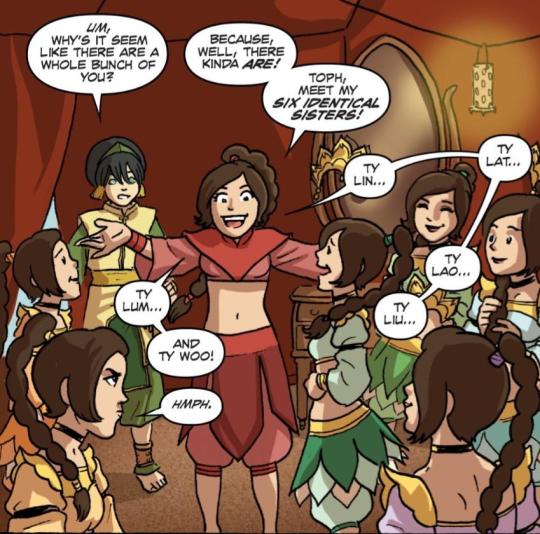
Thus, Ty Lee had the double burden of being part of a matched set and being the singled-out runt of said set.
That's why "Circus Freak" is a compliment. Not because she preferred the circus, but because it's a more creative name.
Ouch.
#avatar the last airbender#ty lee#ty lee atla#ty lee's sisters#lee#atla analysis#atla meta#circus freak#atla the beach
468 notes
·
View notes
Text
I rewatched The Avatar and the Fire Lord a few days ago, and god, what a good episode. Revealing that Zuko is a descendant of both Sozin and Roku was a genius move (and that's not even getting into the Zuko/Aang parallels of it all). But there's something the show doesn't seem to think of, and that I haven't seen anyone in the fandom discuss either — the fact that Zuko isn't the only one descendant from both these men. Azula is, too.
The conclusion of this story that Iroh presents to Zuko at the end of the episode is that he alone — because of his lineage from both men the war was started from — is uniquely capable of cleansing the sins of his family and the fire nation and bringing peace to the world. But, the thing is, there's two sides of this conflict, and therefor two sides to its legacy. The external and the personal. The legacy of the external is the war, but the legacy of the personal is the sibling rivalries that kept repeating through generations of the royal family.
Though Roku and Sozin were not actually related, they were childhood friends as close as siblings and fucking shared a birthday, so the symbolism works. We know very little about Azulon's childhood or if he even had any direct sibling rivalries like this at all, but from what I can find on his wiki page, we know that Sozin favoured him over "other family" (I'm assuming his siblings). What we know very well, however, is what happened in the next generation between Iroh and Ozai. We know Azulon favoured Iroh over Ozai, and that this likely is the initial source of their hatred for each other, which resulted in perhaps the worst sibling rivalry of them all (what with the indirect patricide and throne stealing).
Then we go on to Zuko and Azula, whose upbringing kept going in the same patterns, but the key difference is them being the first ones to both be descendant from the men who started it all. If Zuko having this lineage makes him uniquely capable of ending the cycle of war in his country and restoring balance to the world, shouldn't that mean that both he and Azula having this lineage makes them uniquely capable of ending the cycle of brutal sibling rivalries and restoring balance to their family?
This conclusion I've presented seems to fit perfectly with the lesson Aang draws from the same story as well:
"Roku was just as much Fire Nation as Sozin was, right? If anything, their story proves that anyone's capable of great good and great evil. Everyone, even the Fire Lord and the Fire Nation, have to be treated like they're worth giving a chance."
I know this is supposed to be foreshadowing to Aang refusing to kill Ozai later, but I can't help but think it's even more applicable to fourteen year old Azula. It's really so ironic that the show runners thought Azula deserved what she got when their own show seems to be telling them that Zuko mending his relationship with her is what he ultimately should've done.
But, then again... that does sort of make her the perfect tragedy.
#meta#azula#princess azula#zuko#prince zuko#zuko x azula#avatar the last airbender#atla#avatar meta#avatar the last airbender meta#atla meta#uncle iroh#fire lord ozai#fire lord azulon#fire lord sozin#avatar roku#i LOVE tragic siblings have i mentioned this before?#also can't wait for this either to get 0 notes or invite a bunch of brain dead angry replies#it's pretty much either or for me in this fandom
288 notes
·
View notes
Text
I know people have already talked about this topic, but I want to too.

There are a lot of jokes on the Internet about how Katara constantly mentions her mother as if it were the most important event, but...
Isn't that so? I mean, in the life of a little eight-year-old girl, this is truly the most important event in her life and she wants to share it.
Katara took on the role of an adult too early, and she didn't have the opportunity to work through this problem with anyone, because she's already an adult => she cannot afford to rely on someone. But she needs it, and that's what traveling with Aang gives her: the opportunity to find children like her and share with them the burden that she has been carrying all this time. Note that Haru, Jet, and even Zuko are people who not only have experienced loss, but also have some kind of responsibility for others: for their family or even for a group of people. She doesn't tell adults about this because she isn't looking for care, she's looking for understanding of her feelings.
The problem is that it's not enough for her. Her sadness turns to rage because the further the story goes, the less satisfied Katara becomes.
The closer the heroes get to the end of the war, the more angry Katara gets: first at her father, then more specifically at Zuko. And, in the end, she finds the cause of this anger, as well as the opportunity to satisfy the thirst for understanding of her grief - the murderer of her mother. She needed revenge not just because it was fair, but because from the very beginning of the series, Katara was looking for an opportunity to calm those feelings that were rushing out. And her attempts to do this by expressing the problem were not enough. She needed more, and she got it by facing the biggest monster in her life.
In general, the “monster” metaphor obviously speaks not only about Yon Ra, but also about Katara herself. Or rather about her anger. Judge for yourself: she had to restrain a storm of emotions from the age of eight; she began to reveal her grief only in the first season, that is, at the age of 14. She ignored her pain, pushing it deep inside until it became a raging monster rushing out. And what Katara really needed was to face it. So when she flies to find Yon Ra, she also finally meets the version of herself that she has carefully ignored and hidden for the benefit of others.
It's funny that Zuko is the one who helps her. In general, it was his complete understanding of Katara in this matter that amazed me. He, like no one else, knows what it’s like to face your inner demons and knows how useful it is for knowing yourself. And how dangerous it is when you're alone in it. So he accompanies her to keep her safe. So that she has a person on her side who will be there, no matter what choice she makes. He will support anyone. (I'm crying because of how beautiful it is wasgffv💖)
(A small antikataang insert: this is the reason why their relationship doesn't work. Aang only supports the right decisions, even if they require Katara to sacrifice inner harmony, while Zuko will simply support her for whatever choice she makes. It's funny because Aang has to keep balance and as a monk he knows a lot about that. The show focuses heavily on the theme of yin and yang, that is, the balance of good and evil. In order to achieve internal balance, Katara needed to turn to internal evil, because she tilted this scale towards good. She was imbalanced to begin with, and instead of understanding this, Aang insisted on continuing the preponderance of good. It’s as if he doesn’t understand that the preponderance of good is as bad as the preponderance of evil, and this will only harm Katara. I hope my point is clear)
Finally, Katara finds inner peace when she faced everything that was raging inside her, when she did what she needed and poured out everything she ever wanted. Every word about her mother led us to this moment, as did Katara herself.
And do you know what the point is? Why am I telling all this? It's all a character arc that unfolds linearly over three seasons.
Now think back to the arc of Aang, the main character of the show, in relation to his family. Did he bring them up in seasons two and three in a way that was linear? I mean, the one who constantly grieves over his father's death should have been Aang, because he learned the pain of loss so recently, he didn't have a chance to get used to it. But even in the episode SR, Aang compares the loss of mother not to the loss of his mentor and father, but to the loss of Appa and his people. It’s as if he doesn’t care about the individual connection with Gyatso and it’s nominal.
Katara, on the other hand, has emotions that she smoothly carries throughout the show and resolves in it. She has a huge number of Chekhov's guns, which each fire at its own time. Her feelings about her mother, the development of these emotions and their resolution are the most beautiful thing about this show along with Zuko's arc (even though I have problems with him in book 3).
And making derogatory jokes about it like Katara is whining and annoying is blasphemy. After all, she's the only one of the Gaang who has a single development arc throughout all three seasons, this must be respected
#atla#atla critical#avatar the last airbender#atla meta#anti kataang#anti aang#katara#zuko#zutara#katara supremacy#katara is the real main character change my mind#katara deserved better#katara meta#southern raiders
347 notes
·
View notes
Text
The thing that I find to be so funny and annoying about Azula hate is that people just do not seem to realize that Zuko could have ended up just like her, if it wasn’t for the fact that he had positive influences in his life. One of the many reasons why Azula is the way she is, is because none of the adults thought that she was worth the time and effort. Which Ozai saw and took advantage of. Thanks to his parenting “skills” and other factors, she learned how to play the game very early on in life in order to survive. Zuko, however, never got the memo, therefore he did not know how to play the game. Azula learned how to play the game and Zuko did not. That’s like, one of the many things that sets these two apart from each other, and what ultimately makes Azula’s character so tragic in the end: she thought that learning how to play the game and playing that game well would be what would protect her and keep her safe, but instead it’s what led to her eventual downfall. Meanwhile, Zuko not learning/knowing how to play the game is what initially put him in harm’s way at the palace, but it’s inevitably what saved him and put him on the better path in the end.
429 notes
·
View notes
Text
thinking about what zuko means to azula and weeping. he's a traitor but he's your brother. he held you when you were born. he's banished for being too weak to hurt your father and you learn to hate his goodness. he is somewhere in the world carrying your eyes. he misses your absent mother more than he loves you but that is the price you pay for being the one who stayed. he never grants you this same kindness. you are faster and deadlier and better but it doesn't change the fact that your brave big brother used to tell you stories of dragons every time it stormed because you were so afraid of the thunder. he is the only one who understands what it means to bear the brunt of your bloody inheritance. he crumbled under the weight of it, but you stayed. you always stay. he is half of you. you hate being betrayed.
you don't love him. he's your big brother. who could you possibly love more?
#my favorite most tortured sibling dynamic in the world#zuko and azula#zuko#azula#atla#avatar: the last airbender#fire nation#fire siblings#ozai#iroh#atla meta#poetry#atla comics
3K notes
·
View notes
Text
What Aang’s Relationship With His Kids Tells Us About His Relationship With Katara
Bumi: “Oh, boo-hoo. Must've been real hard for you, flying around the world with dad, riding elephant-koi all day.”
Tenzin: “Oh, so that's what this is all about.”
Kya: “That's what it's always been about. You think you're some savior who has to carry on dad's legacy.”
Tenzin: “Who else is going to do it?”
Kya: “How about all of us?”
Bumi: “Yeah, we're Aang's kids too.”
The whole problem with this family is, Aang didn’t believe that.
Aang has a long, undeviating track record of never questioning anything he believes about the Air Nomads. Who the hell has a perfect and complete understanding of their society, government, international relations, education system, religion, morality, genetics, and reproduction at age 12? According to Aang? He does.
The entire lynchpin of Aang’s Book 3 arc is all about how Air Nomads are pacifists and cannot ever under any circumstances harm a life. (We’re going to ignore the body count Aang’s already wracked up over the first two seasons for the sake of preserving his feelings because those were soulless NPCs or something.)
And yet Aang never questions this…

Monk Gyatso’s bones surrounded by a pile of Fire Nation soldier bones. The picture doesn’t fit Aang’s image of Air Nomad peace and harmony, so he ignores it entirely. It NEVER comes up despite its overwhelming relevance to Aang’s internal conflict and the sorts of advice he seeks from authority figures in the third season (despite Monk Gyatso being the penultimate authority figure in Aang’s life).
Another thing Aang never questions?
There’s no such thing as a non-airbending Air Nomad. They’re just all born that spiritual. And spirituality is the golden key that unlocks bending. (Because Bryke said so.)
Despite Guru Pathik not being a bender. Despite the fact that Zhao, literal spirit murderer, is one. Despite Toph—the most un-spiritual, cynical, feet-on-the-ground-head-nowhere-near-the-clouds member of Aang’s friend group—being the most powerful bender of the lot. Despite Hama being a waterbender equal to none but Katara while completely cut off from her culture and turning her back on everything we believe about water bending’s inherent ties to community, connectedness, and love (Iroh’s words). Despite Azula mastering the god-tier lightning technique BECAUSE she’s practically dead inside and values life least of all things. Despite the fact that Princess Yue has the literal MOON SPIRIT THAT IS THE SOURCE OF ALL WATERBENDING living inside her, and yet she still somehow manages to not be a bender.
Despite the fact that Air Nomads roam all over the world, sewing their wilds oats throughout every nation, yet no airbending toddlers ever crop up in Fire Nation or Earth Kingdom preschools.
Despite the fact that non-monogamous societies where men have multiple partners father more children and boost the population faster than in societies that favor “attached” relationships, yet the all-airbending Air Nomads still somehow have the smallest population of any ethnic group in the world.
Despite the fact that Aang’s twin, Ty Lee, is RIGHT. THERE. with her unparalleled aura-seeing, chakra blocking spirituality and her GRAY EYES in a world where color coding is ~totally~ not a thing… *sigh*
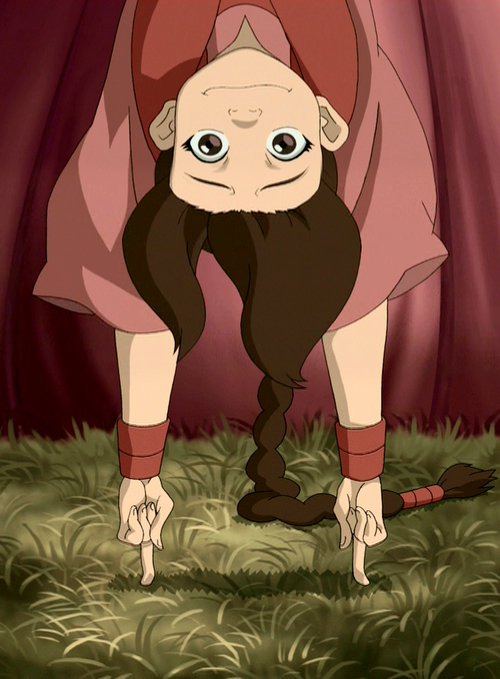
But nope. Air Nomad parentage = airbending child. Always.
So when Katara births a child that is… not an airbender? Not any kind of bender at all, in fact. There’s only one logical conclusion (in Aang’s mind).
That is not Aang’s child.
Aang never had a problem traveling with non-airbenders before. He was non-exclusionary by nature. Katara and Toph and Zuko were welcome. Sokka and Suki were welcome. The more, the merrier, in fact. Because Aang loves nothing as much as he loves an adoring audience.
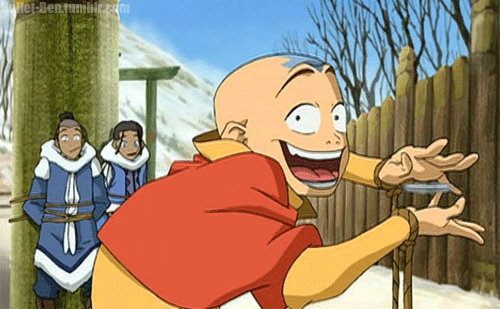
Yet Bumi never travelled with Aang.

Bumi’s as old in this picture as Aang was in the first series. He had an entire decade in which he should have been the most important thing in his parents’ lives. His personality was already more or less formed (not completed, but the groundwork was laid) by the time Tenzin came along. Bumi’s inferiority issues began long before there were any airbending children around to siphon Aang’s attention for training purposes.
Aang and Katara didn’t have another child until Bumi was on the verge of adolescence because Aang was convinced that Katara cheated. And I’m guessing it took Mr. “Let Your Anger Out, And Then Let It Go” about ten years to forgive his wife and give her the chance to get it right. (Which is at least four years longer than he gave her to forgive her mother’s murderer, in case you forgot.)
Acolyte: “Sorry, I thought you were the servants.”
Bumi: “We’re Tenzin’s brother and sister!”
Acolyte: “Avatar Aang had other children? The world is filled with more airbenders?!”
Kya: “We’re not airbenders.”
Acolyte: “Oh… I’m so sorry.”
The Air Acolytes—whose whole identity, purpose, lifestyle, and religion center around every detail of this man's life and beliefs—didn't know Aang had more than one child.
The best case scenario here is that Aang simply pretended his older children didn’t exist because he was ashamed of them and made Katara keep them shut away at all times.
And maybe that could have worked… If Aang and Katara had ever had any privacy in their relationship. But they didn’t.
The Air Acolytes have been following Aang and Katara since the comics. They’ve been there at every step of Aang and Katara’s life together. Observing. Fangirling. Emulating. Diefying. Looking for weaknesses in the relationship because Katara was only his “first girlfriend.”
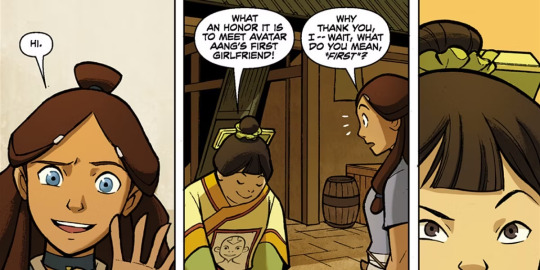
Yet, somehow, they didn’t know Aang had three children.
I can’t imagine a way for them not to know unless Aang actively told people, “Those aren’t my kids,” and let Katara bear the shame and stigma of having the world believe she was unfaithful.
All because Aang couldn't entertain the idea that he was wrong about some facet of a society he never understood clearly.
333 notes
·
View notes